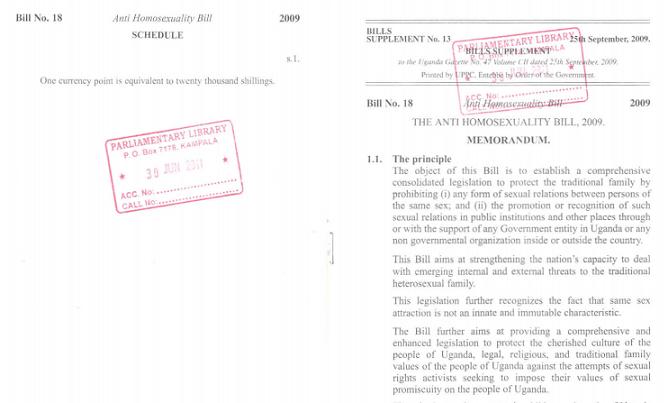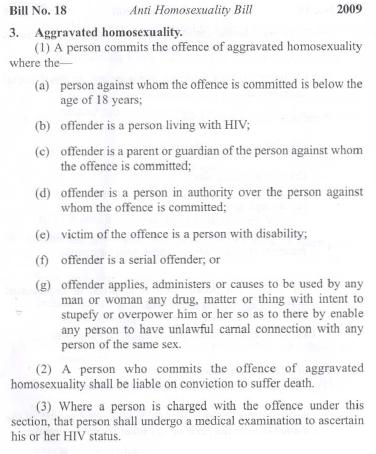According to the Daily Monitor for Friday, January 17, President Museveni sent Speaker of Parliament Rebecca Kadaga a December 28 letter scolding Parliament for passing the Anti-Homosexuality bill without a quorum.
Museveni will apparently not assent to the bill and advised Kadaga that “the NRM Caucus will find a scientifically correct position on the proposed anti-gay legislation” according to the Monitor.
Museveni apparently called gays “abnormal,” but added that legislation would not stop people from becoming homosexuality.
If Museveni formally returns the bill to Parliament, debate will take place. If the requested changes are not made, the President can send the bill back another time. A 2/3 majority would be required at that point to pass the bill. According to one MP, Museveni is committed to softening the bill.
If this is true, then perhaps Sen. Inhofe can express appreciation for stalling the bill when Inhofe meets with Museveni next week.
Category: uganda
Sen Jim Inhofe Heading To Uganda; Will He Speak Against The Anti-Homosexuality Bill?
According to a tweet from Maria Burnett at Human Rights Watch Sen. Jim Inhofe (R-OK) is heading to Uganda. From sources I trust, I have learned that Inhofe and a Congressional delegation will be in Uganda next week.
.@Inhofe should publicly state he does not support the “odious” #AHB during his trip to #Uganda. http://t.co/TVvxqE5aff @maddow
— Maria Burnett (@MariaHRWAfrica) January 15, 2014
Inhofe (@jiminhofe) has stated in the U.S. that he opposes the Anti-Homosexuality Bill, but will he bring up his opposition when he meets with Uganda’s president Museveni? My guess is that regional security issues will dominate the meetings but I hope Inhofe and his delegation will communicate that yhey oppose the human rights disaster in the making in Uganda.
I will add information here as I get it.
Was The Death Penalty Really Removed From Uganda's Anti-Homosexuality Bill? (UPDATED)
UPDATE – 1/14/14: This morning, I received an email from Charles Tuhaise, researcher for Uganda’s Parliament. Charles provided clarification about some of the issues I raised in this post. Thanks to him for the information. I am placing his comments in advance of yesterday’s post because they address some of my questions below. Regarding the manner of handling bills in Uganda, Tuhaise wrote:
Over here, the original Bill remains intact throughout the debate period until the Bill comes up for second reading. At second reading, usually on the same day, the entire Parliament constitutes itself into a “Committee of the whole House” and then effects amendments to the Bill clause-by-clause. After that, the Bill is “read” the third time and is passed by Parliament.
The rules of procedure do not provide for any other way of amending a Bill, after it is printed, other than the above procedure, when the Bill appears for 2nd reading in Parliament’s plenary sitting. That’s why the same copies of the AH Bill are provided whenever you request them. Even if it is a Private Member’s Bill, the Bill’s proponent cannot alter anything in the printed Bill, but must wait to propose such amendment at the Bill’s 2nd reading.
After a Bill is passed by Parliament with amendments, the Clerk’s office undertakes to produce the revised Bill that incorporates the amendments agreed by Parliament. This revised copy of the Bill is never availed to the public but is sent to the President for assent. If the President assents, it goes to the Printers and is next seen by the public as an Act of Parliament, (no-longer a Bill).
I hope this clarifies the issue of Bill amendment. The first time we know which amendments were agreed on in the Anti-Homosexuality Bill, is when it appears as an Act of Parliament (i.e. if the President signs it as passed). Alternatively, one can go to the House record of the debates (the Hansard) to see the amendments agreed when Parliament constituted itself as “Committee of the whole House” – (after the Hansard Department publishes the day’s proceedings – not sure if a copy is already available.)
But, Parliament’s Public Relations Department covered the day’s proceedings and wrote an article that indicates what was agreed on that day.
The article indicates that an act of homosexuality could lead to 14 years in jail with life in prison for repeated offenses. I have also been told that the 30 day period for Museveni’s assent (or not) does not begin until he gets the amended bill. If that is true, then his time for consideration may not have started since he may not yet have the amended bill. I asked Charles to clarify that point and will add that information when I get it.
……………. (Original posts begins below)
After the passage of Uganda’s Anti-Homosexuality Bill on December 20, all news coverage of that event claimed that the death penalty was removed from the bill.
On one other occasion prior to the adjournment of the 8th Parliament, the public was told that the death penalty had been removed. However, later, it was learned that the death penalty was in fact, still in place. And if the committee report that supported the enactment of the bill in December is the same report as offered in May 2011, then the death penalty could very well still be in the bill being considered now by Uganda’s president Yowari Museveni.
I have asked Parliament several times for a copy of the amended bill. Recently, when I asked Parliament’s media relations for a copy of the bill passed in December 2013, I received a copy of the bill tabled in June, 2011. In that bill, there are no changes from the original bill; the death penalty for aggravated homosexuality is still in place.

The date stamped on this bill is June 30, 2011 which was when the bill was tabled in the 9th Parliament. Click the link to read the bill sent to me and described as the bill passed by Parliament. The description of “aggravated homosexuality” is the same.

The death penalty is still in there (UPDATE: but as noted above, the death penalty is supposed to be removed. I still want to see the language myself due to the incident in 2011).
Now it may be that amendments were made and the bill as amended is being kept a secret. However, with the deadline looming for Museveni’s decision, it is worth asking what is actually in the bill. The world was told once upon a time that the death penalty was taken out and that other changes were made. However, the committee report in 2011 revealed otherwise.
Life in prison is bad enough and as this Cameroonian fellow proves, any time spent in prison could be a death sentence, so the removal, if true, is not reason for relief.
As I understand it, the bill becomes law if Museveni does nothing by next Monday (please see above — this may not be true). As of now, in my mind, there is still some doubt about what that law will look like.
Uganda's Speaker of Parliament Accuses Donors of Bullying; Forgets Uganda's Bullying of Gays
According to the Uganda Sunday Monitor:
The Speaker of Parliament, Ms Rebecca Kadaga, has warned the West against “bullying” Uganda over passing the Anti-Homosexuality Bill.
Addressing Uganda’s ambassadors abroad during a meeting with the House committee on Foreign Affairs yesterday, Ms Kadaga took a swipe at foreign countries for targeting Uganda, yet still keeping economic relations with other African countries with the same law.
As a taxpayer, I am glad the government is considering human rights in their donor decisions. I can think of a few other countries I would like to see get less money from the U.S. over human rights violations.
Speaker Kadaga should consider how she would like her government to bully gays.
Kadaga’s rhetoric makes me think that she is facing some heat internally. My guess is that she has political aspirations beyond being speaker and would like to use the gay issue in a populist appeal.
Uganda's President May Not Sign Anti-Homosexuality Bill; Ssempa Involved in Stealth Plan to Pass Bill
According to Uganda’s New Vision, Ugandan president Yowari Museveni may not sign the Anti-Homosexuality Bill. He told the NV that he would read it before he decides what to do.
While it may seem like such a course should not need to be stated, Museveni has not returned a bill to Parliament during this Parliament. Thus, his statement is a signal that he may depart from his usual practice.
Museveni could slow the bill down by sending the bill back to Parliament with suggestions. The Parliament could then send it to committee where it could remain indefinitely. If the Parliament returns the bill, Museveni can send it back again if he doesn’t like it. Eventually, if the Parliament returns it to him after a two-thirds vote (the second time around), the bill will become law. However, the Parliament could elect to allow the bill to remain in committee until the Parliament closes thereby allowing it to expire. For a detailed examination of the bill in the context of Uganda’s constitution, see this summary at Box Turtle Bulletin.
For a fascinating examination of the events surrounding the passage of the bill, view this video.
[youtube]https://www.youtube.com/watch?v=w17pWglQHcQ[/youtube]
For more context of the passage of the bill, see this article in Uganda’s Observer. Note the role of Ugandan minister Martin Ssempa in hatching a plan to pass the bill in stealth mode. I hope the bill is challenged in court there and this information used to indicate how Parliament violated rules of procedure in order to prevent opposition from having their voice.
While I have yet to see the bill, the amendments are describe in the Observer article. I want to see the actual language before I concede that the death penalty has been removed, but it certainly seems likely that it has been. However, life in prison is practically a death sentence in Uganda.
UPDATE: Andrew Mwenda speaks out against the Anti-Homosexuality Bill on NTV last night.
[youtube]http://youtu.be/lUlQHZlM2yI[/youtube]